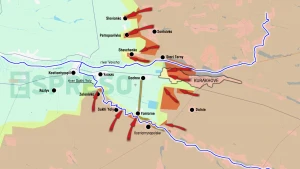
Land mines cover one-third of Ukraine's territory – UN
As a result of the Russian invasion, almost a third of Ukraine's territory is contaminated with explosive ordnance
UN Under-Secretary-General Rosemary DiCarlo reported this.
"Land mines will continue to pose dangers to civilians for years to come as almost one third of the country is reportedly contaminated with unexploded ordnance, landmines and cluster munitions. We are working with the Government of Ukraine and other partners to tackle this threat of unexploded ordnance. So far, our mine action efforts have reached almost 3.5 million people," she said.
The UN Under-Secretary-General also emphasized that as a result of the Russian invasion, Ukrainian civilians, including children, are being maimed and killed due to violations of the laws of war and the use of indiscriminate weapons.
"Children in Ukraine continue to be disproportionately affected by the appalling high level of grave violations in this conflict. Children are being killed and maimed by explosive weapons with wide area impact in populated areas. Millions of Ukrainians, including nearly two-thirds of Ukrainian children, have been forced to leave their homes. For those who remain, the damage and destruction of critical infrastructure continues to cause hardships, as access to basic services are disrupted," DiCarlo said.
In addition, the UN Under-Secretary-General spoke about the damage and destruction of healthcare facilities, cultural sites and educational institutions.
"The World Health Organization has documented damage to over one thousand health care facilities, resulting in 101 deaths and 139 injuries. Since the start of Russia’s full-scale invasion of Ukraine, UNESCO has verified damage to 270 cultural sites, including 116 religious sites, 27 museums, 95 buildings of historical significance, 19 monuments, 12 libraries and one archive. Moreover, 3,467 educational institutions have also suffered from bombing and shelling with 335 of them destroyed," she said.
She also cited UNESCO data, according to which 12 journalists and media workers have been killed since the start of the full-scale war.
Rosemary DiCarlo emphasized that the Russian invasion has far-reaching consequences for the environment and society.
"The destruction of the Kakhovka Dam on 6 June and the subsequent flooding have far-reaching, long-term environmental and humanitarian consequences. According to Ukraine's Agriculture Ministry, almost 600,000 hectares of farmland no longer have access to irrigation water following the dam destruction. This compounds the existing challenges that Ukrainian farmers face, in addition to mines and unexploded ordnance. The flooding also worsened the already volatile situation at the Zaporizhzhia Nuclear Power Plant. Experts of the International Atomic Energy Agency (IAEA) continue to closely monitor the availability of cooling water for the Plant. Ensuring its safety and security remains of utmost importance not just to Ukraine, but to the broader region. But these figures are not the whole story. The war has impacts that are harder to measure. A generation of Ukrainian children has been traumatized, and the impacts of the war on the mental health of children and adults will be long-lasting," Rosemary DiCarlo emphasized.
Earlier, Pentagon chief Lloyd Austin said that the United States would help Ukraine demine areas where cluster munitions were used.
According to The Washington Post, the main obstacle to the Ukrainian Armed Forces' counteroffensive is the Russian dense mining of Ukrainian territories.
- News











































